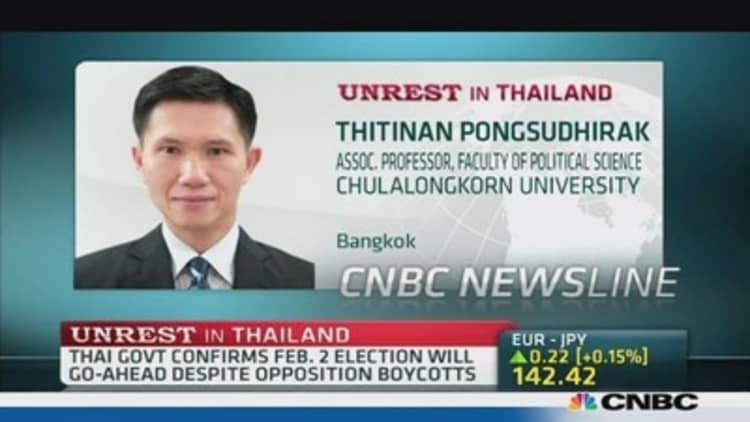As Thailand's anti-government protests sputter, it appears likely the only major effects will be hamstrung economic growth and a sharp political divide, with the ruling party's popularity largely intact.
This week 's protest to shutdown Bangkok was meant to be the pinnacle of months of demonstrations in the capital. But so far, many threatened actions – such as plans to prevent the stock market trade and to shutter air-traffic control – have come to naught , stymied in part by technology as many government employees are able to work from alternate locations.
Observers say protestors' numbers are dwindling. But they are leaving behind a deep political divide over the future of the country's democracy before the February 2 elections.
(Read more: Has the Bangkok shutdown lived up to its hype?)

"The election date now has become a kind of a fault line. Those who are pro-elections, they want to stick to the democratic system. They are pro-government, some of them," Thitinan Pongsudhirak, director of the Institute of Security and International Studies at Chulalongkorn University, told CNBC.
"But those who are against the elections, they want to reform before the election takes place. So the fault line now is very clear," he said.
Protestors have demanded an unelected "people's council" to push through reforms on election and corruption policies.
(Read more: Do Thai protestors have the government in checkmate?)
Part of the demand, as well as the main opposition Democrat party's decision to boycott the election, may be due to widely held expectations that Prime Minister Yingluck Shinawatra and her political party, Pheu Thai, which has won every election since 2001, will once again sweep into power.
Additionally, protestors don't want to allow an election prior to reform efforts as "they expect the same politicians will be back in the parliament and there will be no real reforms," said Mayuree Chowvikran, a strategist at Maybank-Kim Eng in Thailand.
To be sure, it's not clear why protestors believe an unelected government will be less corrupt than an elected one.

Another demand calls for ending populist policies that provide direct subsidy funds to rural areas, noted Daniel Martin, an economist at Capital Economics.
"They see it as vote buying," he told CNBC. "It's not as though directing funding to poor people in rural areas is the worst thing in the world, but at the same time it is a dodgy tactic."
Thailand's multi-billion-dollar rice subsidy program has been a boondoggle, losing around $4.3 billion on the 2011-2012 crop, the last time losses were reported. The program was meant to buy rice from farmers at much higher than market rates, aiming to increase rural incomes to stimulate consumption, but farmers haven't been paid in around four months as funds ran low.
(Read more: Why you shouldn't pounce on Thai shares yet)
Farmers, among Pheu Thai's biggest supporters, may need to keep waiting for their money. Mayuree noted many farmers are falling deeply into debt amid the delays.
Reuters reported Thailand's state-backed farm band administering the program raised around $990 million in a domestic bond issue. The program is also trying to sell the rice it purchased from farmers, but losses are likely, Reuters reported, citing sources saying the rice is being offered at $475 a ton compared with purchase prices estimated at around $669 a ton.
But even if payments to farmers continue to be delayed, it isn't likely to play into the protestors' favor.
"It's not very good to upset your solid base," said Martin. "But at the same time, if you're a farmer, who are you going to support: people who haven't paid you under the scheme or the people who want to do away with the scheme altogether?"
(Read more: Why Thailand's political strife is far from over)
Thitinan agrees. "They don't want to vote for the alternative. And the alternative is not running. The Democrat party is not running."
Helping to account for the support, there are solid indications that the payments may have helped to alleviate poverty in rural Thailand, with the poverty reduced from a peak of around 42.6 percent of the population in 2000 after the Asian Financial Crisis, to around 13.2 percent in 2011, according to the World Bank; most of the poor live in the country's rural areas.
But while the fate of the upcoming elections remains in doubt, one thing is clear: political turmoil has taken a chunk out of economic growth.
Thailand's Finance Ministry cut its growth forecast for this year to around 3 percent from its previous forecast of 4.5 percent, citing the ongoing political tensions.
—By CNBC.Com's Leslie Shaffer; Follow her on Twitter @LeslieShaffer1

